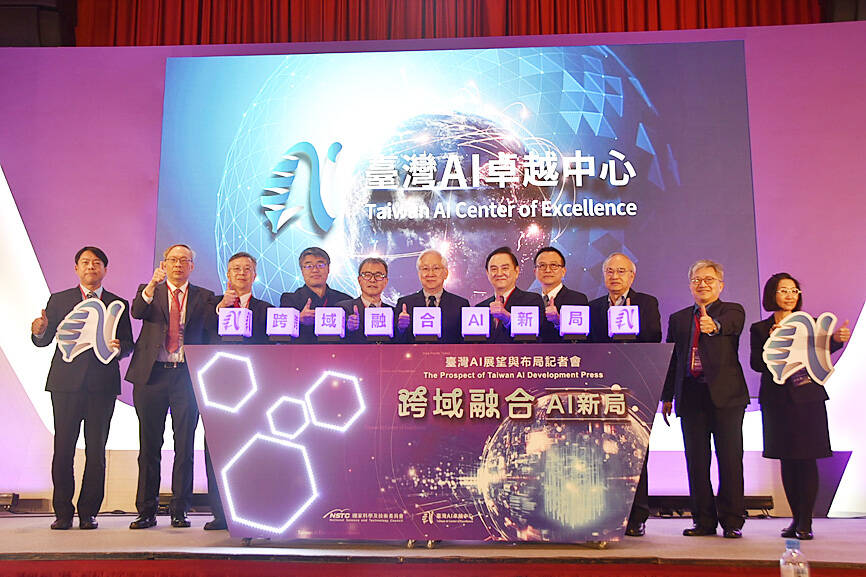The National Science and Technology Council on Tuesday opened the Taiwan AI Center of Excellence (Taiwan AICoE), tasked with developing the nation’s artificial intelligence (AI) capability.
At a launch ceremony in Taipei, Minister of Science and Technology Wu Tsung-tsong (吳政忠) said that AI applications have advanced rapidly and become an integral part of everyday life since the government set 2017 as “year zero” for Taiwan’s AI industry.
The launch last year of ChatGPT, developed by US-based OpenAI, caught China and Japan off guard, and has presented new challenges such as questions regarding the ethics, rule of law and human rights associated with the use of AI, Wu said.

Photo: Wu Po-hsuan, Taipei Times
The council is vigorously formulating ethical and general principles in an intergovernmental effort to codify terms governing the use of AI to bring Taiwan in line with global AI initiatives, while leveraging Taiwan’s international influence in the field of AI governance, he said.
Wu said he hopes that the center, which is run by the council, would serve as a platform to streamline efforts by government agencies seeking to formulate rules governing AI applications and facilitate collaborations on international AI projects.
Taiwan AICoE head Tsai Zse-hong (蔡志宏) said the center would seek to initiate international collaborations on enhancing core AI technologies, creating an AI talent pool in the Asia-Pacific region by tapping into leading international AI institutions and joining “human-centered” AI organizations to forge reliable partnerships around the technology with like-minded countries.
Taiwan AICoE is in talks with international institutions on several AI proposals and would serve as Taiwan’s point of contact for international projects as well as provide guidance on the planning and development of the local AI sector, Tsai said.
Asked about progress on the National Science and Technology Council’s plan to develop a “Taiwanese ChatGPT” for public use, Tsai said it is close to putting together a team to collate data suited to Taiwanese society and culture, at which point it would test such software.
Wu has set a deadline for projects to start producing tangible results by the end of this year, Tsai added.
Expansions are planned for the AI-powered Taiwania 2 supercomputer developed by the National Applied Research Laboratories to accommodate the project and create a Taiwanese ChatGPT, he said.
Current efforts are focused on testing computing power and datasets, which Taiwania 2’s more than 2,000 graphics processing units should be able to cover, he said.

NEW IDENTITY: Known for its software, India has expanded into hardware, with its semiconductor industry growing from US$38bn in 2023 to US$45bn to US$50bn India on Saturday inaugurated its first semiconductor assembly and test facility, a milestone in the government’s push to reduce dependence on foreign chipmakers and stake a claim in a sector dominated by China. Indian Prime Minister Narendra Modi opened US firm Micron Technology Inc’s semiconductor assembly, test and packaging unit in his home state of Gujarat, hailing the “dawn of a new era” for India’s technology ambitions. “When young Indians look back in the future, they will see this decade as the turning point in our tech future,” Modi told the event, which was broadcast on his YouTube channel. The plant would convert

‘SEISMIC SHIFT’: The researcher forecast there would be about 1.1 billion mobile shipments this year, down from 1.26 billion the prior year and erasing years of gains The global smartphone market is expected to contract 12.9 percent this year due to the unprecedented memorychip shortage, marking “a crisis like no other,” researcher International Data Corp (IDC) said. The new forecast, a dramatic revision down from earlier estimates, gives the latest accounting of the ongoing memory crunch that is affecting every corner of the electronics industry. The demand for advanced memory to power artificial intelligence (AI) tasks has drained global supply until well into next year and jeopardizes the business model of many smartphone makers. IDC forecast about 1.1 billion mobile shipments this year, down from 1.26 billion the prior

People stand in a Pokemon store in Tokyo on Thursday. One of the world highest-grossing franchises is celebrated its 30th anniversary yesterday.

Zimbabwe’s ban on raw lithium exports is forcing Chinese miners to rethink their strategy, speeding up plans to process the metal locally instead of shipping it to China’s vast rechargeable battery industry. The country is Africa’s largest lithium producer and has one of the world’s largest reserves, according to the US Geological Survey (USGS). Zimbabwe already banned the export of lithium ore in 2022 and last year announced it would halt exports of lithium concentrates from January next year. However, on Wednesday it imposed the ban with immediate effect, leaving unclear what the lithium mining sector would do in the